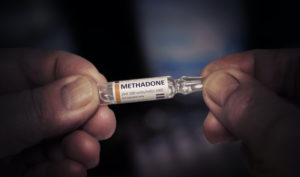
Scholars discuss the lack of uniform standards for health care provided behind bars.
Only one group of people in the United States has a constitutional right to health care—the incarcerated.
In 1976, the Supreme Court ruled that depriving incarcerated individuals of reasonably adequate medical care violates the Eighth Amendment’s ban on cruel and unusual punishment. But who decides what is reasonably adequate?
The answer is not so clear. Multiple agencies at federal, state, and local levels possess authority over correctional health care. The Federal Bureau of Prisons (BOP) oversees the provision of medical, dental, and mental health services in federal prisons. The vast majority of the incarcerated, however, are held in state prisons and county jails, where standards vary by state and by county.
Some facilities are accredited by private organizations such as the National Commission on Correctional Health Care (NCCHC), which requires compliance with certain process and quality measures. But this accreditation process remains entirely voluntary, leaving the correctional health care system without a uniform set of standards.
This lack of mandatory standards or oversight has led to pervasive inadequate care. One study found that among incarcerated individuals with a persistent medical problem, 20 percent of those in state facilities and 68 percent of those in local jails went without care. Prison medical staff also commonly fail to perform routine gynecological exams, to screen for prevalent infectious diseases, or to administer prescribed medications. Few prisons provide comprehensive medication-assisted treatment for people with substance use disorder, despite the high prevalence of the condition found among the incarcerated.
Some activists attribute this pattern of inadequate care to increasing privatization, as states seek to constrain rising correctional health care costs. In an ongoing class-action lawsuit in Arizona, incarcerated individuals allege that the state’s private health care contractor has provided “grossly inadequate” care that has led to preventable injury, disfigurement, and death. The facilities at issue in the case are NCCHC accredited, casting doubt on the efficacy of the current accreditation process.
Nearly 2 million individuals are currently incarcerated, 800,000 of whom have a chronic medical condition. In an era of mass incarceration, the substandard state of the correctional health care system has a profound impact.
In this week’s Saturday Seminar, experts discuss how increased regulation can protect the constitutional right of incarcerated people to receive adequate health care.
- In an article in Public Health Chronicles, Susan M. Reverby of Wellesley College considers modern day prison health care in the context of prison health care in the 1970’s. Reverby reviews a 1974 study of prison health care conditions and concludes that many of the concerns identified—including too few physicians, lack of follow up, and lack of primary health care—persist today. She attributes the lack of reform in part to increasing privatization of prison health care and mass incarceration. Reverby further argues that conditions will not improve until the humanity of incarcerated people is recognized and care outweighs control.
- The Medicaid “inmate exclusion” policy makes federal Medicaid funds unavailable for medical treatment provided to incarcerated people, explains Mira K. Edmonds of the University of Michigan Law School. In an article published in the Georgetown Journal on Poverty Law and Policy, Edmonds argues that the elimination of the policy is necessary to finally end the Medicaid program’s distinction between the “deserving” and “undeserving” poor and to advance the recognition of health care as a human right. She contends that the introduction of Medicaid funding into prisons would come with higher federal standards of care, expanded mental health care services, and substance abuse treatments for incarcerated individuals.
- In an article in Law & Social Inquiry, Spencer Headworth and Callie Zaborenko of Purdue University explore private accreditation trends among correctional health care practitioners. Headworth and Zaborenko compare each state’s number of NCCHC accredited physicians to the number of lawsuits alleging inadequate prison health care and to prison mortality rates. They report that higher rates of litigation predict increased accreditation but that increased accreditation has no impact on prison mortality rates. Headworth and Zaborenko conclude that correctional facilities use private accreditation as a reaction to legal threats rather than as a proactive measure to protect the health of incarcerated people.
- The prison health care crisis has severe consequences for reproductive health, argue Lauren Kuhlik and Carolyn Sufrin of Johns Hopkins University. In an article published in the Harvard Law and Policy Review, Kuhlik and Sufrin criticize the lack of federal standards for reproductive health care behind bars. They describe individual prison policies that limit access to abortion services, permit inadequate prenatal care, and allow the shackling of pregnant people during childbirth. According to Kuhlik and Sufrin, such systemic neglect is a form of state violence and reproductive injustice. They argue that state domination of reproductive health care is a purposeful and oppressive method of carceral control.
- Health care planning for incarcerated individuals often deemphasizes and neglects dental care despite the physical and psychosocial benefits of oral health, writes Anne S. Douds of Gettysburg College and her coauthors in an article in Annals of Health Law and Life Sciences. They argue that despite the significant oral health needs of the prison population, incarcerated people lack access to adequate dental care. For example, some states follow an “extraction only” rule, under which prison dentists will not “fill, crown, or otherwise attempt to salvage teeth.” Douds attributes the lack of dental care access to costly copays and prison health research that emphasizes medical care over dental care. Douds and her team recommend that prison dental care programs disseminate oral health educational material to incarcerated people and improve telehealth options.
- In an article published in the Notre Dame Journal of International & Comparative Law, Juan E. Mendez of the American University Washington College of Law proposes reforms to the United Nations Standard Minimum Rules for the Treatment of Prisoners. Mendez argues that the revised rules should recognize the “right to access” standard and adequate medical, psychiatric, and dental care. This recognition would call for measures such as an absolute prohibition on engaging in torture, the provision of medical supplies to prisons, and procedural safeguards, such as routine medical examinations, Mendez argues. Mendez also recommends providing special measures to protect vulnerable or high-risk groups such as children, mothers, and LGBTQ+ persons in the criminal justice system.
The Saturday Seminar is a weekly feature that aims to put into written form the kind of content that would be conveyed in a live seminar involving regulatory experts. Each week, The Regulatory Review publishes a brief overview of a selected regulatory topic and then distills recent research and scholarly writing on that topic.



